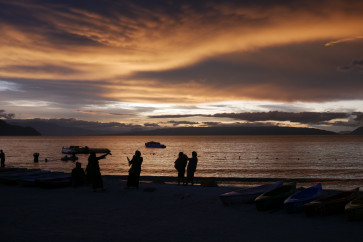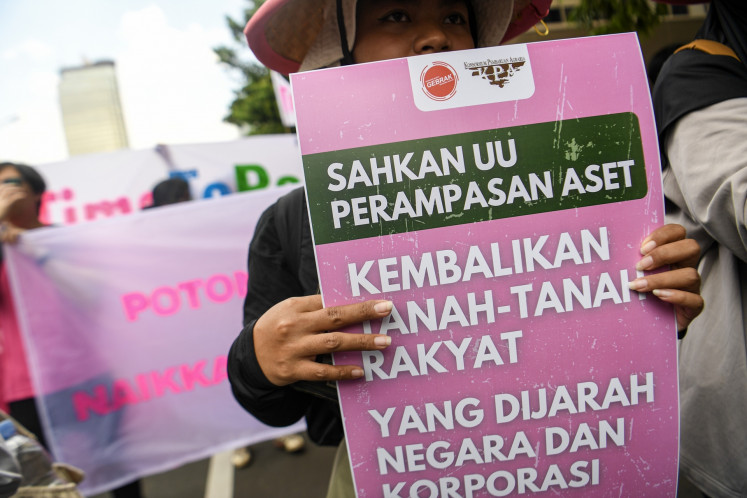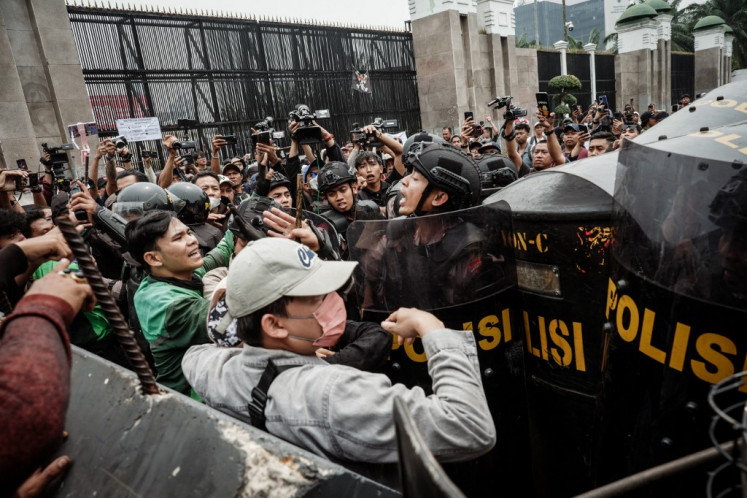Popular Reads
Top Results
Can't find what you're looking for?
View all search resultsPopular Reads
Top Results
Can't find what you're looking for?
View all search resultsCommentary: Hello, I am an Asean. Who are you?
Today, Dec
Change text size
Gift Premium Articles
to Anyone
T
oday, Dec. 31, 2015, a new community called ASEAN is born. Beginning in the New Year, those of us living in Southeast Asia can proudly claim ourselves to be an Asean.
But most of the 600 million-plus citizens in the 10 member countries of the Association of South East Asian Nations (ASEAN) are not even aware that overnight they will have become part of a large community. Even if they are, they probably don't care much.
In spite of the pronouncement by their governments ' Brunei, Cambodia, Indonesia, Laos, Malaysia, Myanmar, the Philippines, Singapore, Thailand and Vietnam ' of the launching of the ASEAN community, their lives won't be affected. Nothing really changes. Life goes on as usual for most people.
Outside the region, even fewer people have heard of ASEAN. In the US, you would get a weird look if you say you're an 'Asean'. They will ask, why do you pronounce 'Asian' funny?
The new ASEAN community is saddled not only with an identity problem, but also a name problem. Citizens of the European Union countries have no trouble calling themselves 'Europeans' and those of the US go around proclaiming to be 'Americans'.
But should we call citizens of the new community 'ASEANs' or 'Aseans'? It would be awkward to use an acronym for a community, but this is a reflection of ASEAN's specialty in creating soups alphabet.
Then comes the next question: What exactly is this ASEAN community?
The most-often cited answers from ASEAN officials are that the AC is NOT the EU or the USA. Forget about borderless ASEAN, forget about free movement of labor and forget about a common currency.
Also forget about having common principles and values when the 10 member countries are governed under very different political systems: An absolute monarchy, two military juntas, three communist states, two semi-democracies and two struggling liberal democracies.
At best, there will be more free trade between countries that produce and export the same stuff. Their economies have been integrating in the last two decades through the ASEAN Free Trade Area (AFTA), but there is a limit how far they can integrate. In the global market, they are often rival competitors.
Economic integration has already taken place even without the community tagline, but ASEAN officials, in their desperation to show something tangible before the launch of the ASEAN community, have focused more on economic integration and less on the political and social/cultural integration as mandated under the blueprint. Rather than ASEAN Community, many today would talk about the ASEAN Economic Community (AEC).
If ASEAN governments, Indonesia in particular, appear to be indifferent or unenthusiastic about the new community, why did we bother in the first place?
ASEAN leaders at their summit in Bali in 2003 declared the ambitious plan to turn the region into a single community. At the time, there was the realization that the center of gravity of the global economy was shifting to Asia, driven primarily but not exclusively by the rise of China and India.
ASEAN leaders saw the need to respond lest Southeast Asian countries sank or are reduced to mere economic satellites of the two emerging giants. Collectively rather than individually, we stand a better chance of surviving the fierce competition of a more globalized economy, so they declared.
The leaders set a 2020 target for ASEAN to become a single community, assigned an eminent persons group made up of elderly statesmen to prepare the blue prints, first of turning ASEAN into an organization with a formal charter and second the roadmap to an ASEAN community.
The leaders' enthusiasm remained strong as late as 2007 when, sensing the urgency, they moved forward the community deadline to 2015. By 2012, reality about the implications to their respective sovereignty began to sink in and they moved back the deadline from Jan. 1 to Dec. 31, 2015.
Since then, the ASEAN governments have done a great job to put many exclusions into the community arrangements, even to the point of neglecting the preparations.
By the time of its launching on Dec. 31, we have an ASEAN community in name only.
Becoming a true community means states must give up part of their sovereignty to a supranational body. This is something none of the ASEAN governments are willing to do.
The ASEAN Charter drawn up based on the eminent persons group's recommendations began as a progressive document, with principles of democracy, freedom and human rights written in, but it was widely watered down by the time it was endorsed by the leaders in 2007.
ASEAN could not give up the principles of non-interference and decision-by-consensus, which have been the keys to the group's success in its first 40-year history since 1967, but are now considered elements that hold back progress to its becoming a meaningful community.
ASEAN bureaucrats have forgotten, or simply discarded, the very reasons why their leaders in 2003 decided on the creation of the community: ASEAN's very own survival.
With China and India now becoming truly Asian and global economic powers, the urgency for a community becomes stronger, not less.
For good or for bad, the ASEAN community has now been launched. Perhaps the real work in turning this into a real community will begin.
For now, let's just celebrate the birth of the ASEAN community.
________________________________
The writer is a senior editor of The Jakarta Post










